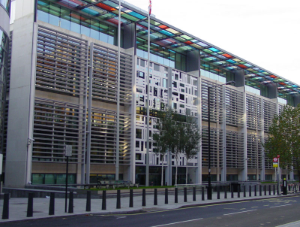Review published in response to data-sharing complaint submitted by Liberty and Southall Black Sisters
The Home Office last week published the results of its review into data sharing arrangements between the Home Office's Immigration Enforcement directorate and the police for migrants with insecure immigration status who are victims or witnesses of crime.
 Image credit: UK GovernmentYou can read the 17-page review here.
Image credit: UK GovernmentYou can read the 17-page review here.
The review was undertaken following a super complaint submitted by the human rights group Liberty and the women's rights charity Southall Black Sisters in December 2018. The organisations were concerned that police share the data of victims and witnesses of crimes with the Home Office for immigration enforcement purposes. They noted that, in particular, migrant women who are subject to domestic abuse are afraid to report it in case their details are handed to immigration authorities as a result. The complaint called for a complete 'firewall' to prevent the sharing of data of victims and witnesses of crime.
Last year, a joint report by HM Inspectorate of Constabulary and Fire and Rescue Services, the College of Policing and the Independent Office for Police Conduct (IOPC) responded to the super complaint by recommending that police should restrict the sharing of information with the Home Office's Immigration Enforcement directorate.
Announcing the publication of last week's review, Rachel Maclean MP, the Parliamentary Under-Secretary of State for the Home Department, told the House of Commons that the Home Office acknowledged the concerns raised around the current data sharing arrangements and recognised that there is room for improvement.
The Home Office, however, did not accept the recommendation for a data sharing firewall with the police, nor did it consider that a temporary or time-limited firewall could be an optional solution.
In the review, the Home Office emphasised that knowing an individual's immigration status provides crucial information to assist and support victims when dealing with other authorities and seeking legal advice.
It noted: "Information sharing enables, for example, the police to potentially acquire a fuller understanding of a migrants' particular needs and circumstances. The Home Office may have relevant information and be able to help to protect and support victims and help with an investigation (including establishing the immigration status of the perpetrator), which may assist in determining the most appropriate and effective intervention(s)."
The information is used to establish vulnerabilities and safeguarding needs and to assess whether the migrant may be eligible to qualify for leave under the Immigration Rules or bespoke routes.
As a result, the Home Office concluded: "Current data sharing practices between the police and the Home Office are essential in protecting those most vulnerable and enforcing the UK's immigration laws. Proposals to cease or delay data sharing between the police and the Home Office on migrant victims and witnesses of crime with irregular immigration status would be harmful to both the safeguarding of those victims and witnesses and the public interest."
To address current concerns, the review does recommend that the Home Office and police establish a new Immigration Enforcement (IE) Migrant Victims Protocol as an alternative to a data sharing firewall and to give greater transparency to victims on how their data will be shared.
The review explains: "[T]he Home Office will introduce an IE Migrant Victims Protocol for migrant victims of crime that have been referred to IE from the police. As part of this we will further commit to a medium-term piece of work to identify safeguards to mitigate the deterrence effect of data sharing. The protocol will set out that no immigration enforcement action will be taken against that victim while investigation and prosecution proceedings are ongoing, and the victim is receiving support and advice to make an application to regularise their stay. We will seek to operationalise this using dedicated officers who are trained to receive referrals from police, provide information and signposting at the point of the referral from police and keep contact with the individual on the progress of support and advice being received."
Following the publication of the review, Nicole Jacobs, the independent Domestic Abuse Commissioner, criticised the Home Office's decision and said the Government had failed vulnerable survivors of domestic abuse.
Speaking on Thursday, Jacobs commented: "I am extremely disappointed with today's decision and very concerned that the measures put forward today will be inadequate when it comes to keeping migrant victims of domestic abuse safe from perpetrators and free from the risk of being deported for reporting their abuse. … The measures outlined in the protocol today do not go far enough to address the fear that information will be shared with immigration enforcement, which prevents many victims and survivors from reporting domestic abuse."
The independent Domestic Abuse Commissioner said victims' safety must be put ahead of their immigration status.
Southall Black Sisters and the Latin American Women's Rights Service (LAWRS) were also highly critical of the Home Office's decision. The two groups said:
"We are dismayed by the outcome of the Home Review. By rejecting our proposal for a meaningful firewall between the police and immigration enforcement, the government has clearly signalled the view that immigration enforcement takes priority over the safety of victims.
"We strongly disagree with the alternative proposal to create an Immigration Enforcement Migrant Victims Protocol which is meaningless since it risks consolidating the sharing of domestic abuse victims' data between the police and immigration enforcement as a standardised practice across all police forces nationally."